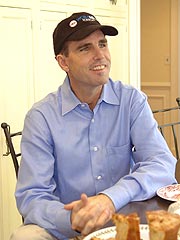Seymour Hersh reports that the Bush administration is making plans for a massive bombing campaign in Iran.
That in itself is not particularly surprising. Such contingency plans are standard fare in military circles, and as I've said before, a bombing campaign may well be necessary to keep Iran from getting nuclear weapons.
And before getting too excited, we should note that all the sources are anonymous. Hersh is a solid investigative journalist, so he gets the benefit of the doubt from me. But don't jump on this as proven fact just yet.
That said, the report contains two remarkable and worrisome details:
There is a growing conviction among members of the United States military, and in the international community, that President Bush’s ultimate goal in the nuclear confrontation with Iran is regime change. Iran’s President, Mahmoud Ahmadinejad, has challenged the reality of the Holocaust and said that Israel must be “wiped off the map.” Bush and others in the White House view him as a potential Adolf Hitler, a former senior intelligence official said. “That’s the name they’re using. They say, ‘Will Iran get a strategic weapon and threaten another world war?’ ”
Adolf Hitler? Even if Ahmadinejad had aspirations to be a new Hitler, he wields little actual power withint Iran -- and Iran is no Germany in terms of military strength. Bandying that term about so readily indicates a moralistic drive behind the planning, and calls up two bad associations I had hoped were dead and buried. It's very neocon language, and in the runup to the invasion of Iraq the administration repeatedly invoked Hitler in relation to Saddam Hussein. They can't seriously be contemplating the same thing with Iran.
And regime change through bombing? Has that ever worked? Apparently the administration thinks it will this time:
One former defense official, who still deals with sensitive issues for the Bush Administration, told me that the military planning was premised on a belief that “a sustained bombing campaign in Iran will humiliate the religious leadership and lead the public to rise up and overthrow the government.” He added, “I was shocked when I heard it, and asked myself, ‘What are they smoking?’ ”
Every conflict I can think of teaches the opposite lesson: that bombing rallies a population behind the government, however despised it may be otherwise. Iranians may dislike the mullahs, but they will dislike American bombs even more. It may be necessary to send in bombers to disrupt their nuclear capacity; but sending in bombers in hopes of toppling the mullahs is pure fantasy.
If this report is true, it means the same strain of naivety and wishful thinking that led to the botched Iraqi occupation is still in control of administration thinking -- which means besides being naive they're also incapable of learning from experience.
The second notable thing is that the administration is reportedly considering using tactical nuclear bunker busters to get at deeply buried facilities. On one level this is simply practical: If the facility is buried deeply enough, like the main Iranian centrifuge plant at Natanz, a nuke may be the only way to destroy it. But the political fallout from America using nuclear weapons again, as well as the irony of using nuclear weapons to keep Iran from obtaining nuclear weapons, should give planners serious pause. But apparently it's not.
The attention given to the nuclear option has created serious misgivings inside the offices of the Joint Chiefs of Staff, he added, and some officers have talked about resigning. Late this winter, the Joint Chiefs of Staff sought to remove the nuclear option from the evolving war plans for Iran—without success, the former intelligence official said. “The White House said, ‘Why are you challenging this? The option came from you.’ ”
We should avoid nukes if at all possible. Maybe we can simply deny use of deeply buried facilities by destroying the entrances, ventilation shafts and the like. Maybe we can simply target and destroy any vehicles moving in and out of it, so that whatever is in the facility stays there. It may take more work, and be less certain of success. But that is probably preferable to the huge downsides of using nukes.
Here's what I worry about:
Speaking of President Bush, the House member said, “The most worrisome thing is that this guy has a messianic vision.”
That's what got us in trouble the first time. And it's impervious to reason.
A bombing campaign to eliminate Iran's nuclear capability is one thing, and something I will support once it's clear the diplomacy is going nowhere -- as I think it is. And if the preparations are part of a campaign to put pressure on Iran and show them that we're serious about using force if necessary, so much the better. Diplomacy based on the threat of force requires that the threat be credible.
But the principles underlying the reported planning go far beyond that -- and are a huge mistake.
nuclear, Bush, bombing, Iran, politics, midtopia






